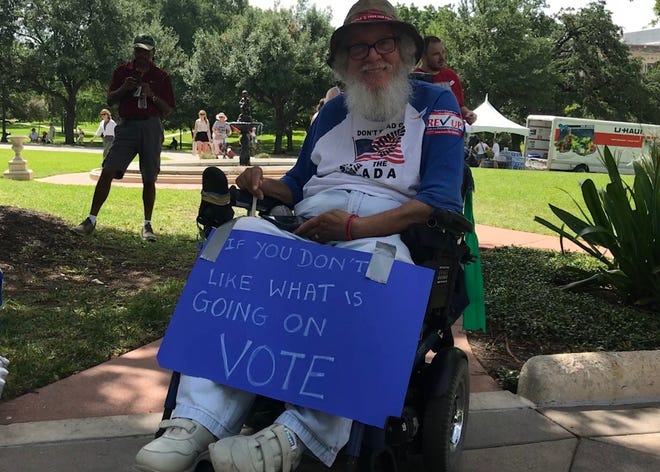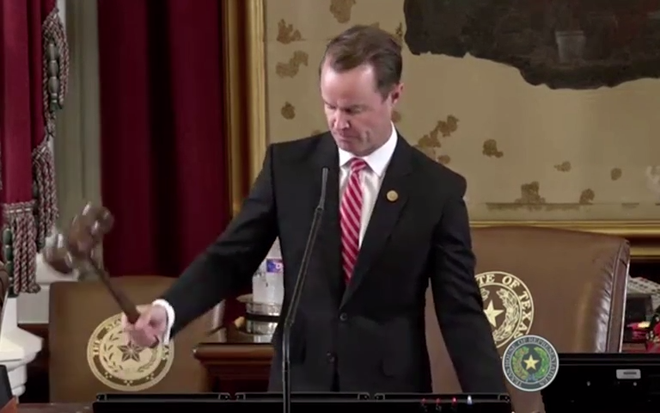AUSTIN — Chase Bearden and Bob Kafka say they already face too many barriers to the ballot box, and they worry that the sweeping legislation that passed the Texas Senate on Thursday would erect even more.
Bearden and Kafka were among several people with disabilities who testified earlier in the week in opposition to the measure known as Senate Bill 1. They said proposed new standards in the bill for signature verification and restrictions on mail-in and curbside voting would make it harder, and in some cases impossible, for people like them to safely and conveniently cast their ballots.
“We’re trying to get them, if they’re going to pass a bill, to actually make it to where the disability community is on an equal playing field with being able to vote,” Bearden, who broke his neck as teenage gymnast 28 years ago, said in an interview after his formal testimony before the Senate State Affairs Committee.
Texas issues arrest warrants:Texas Supreme Court temporarily blocks order protecting House Democrats from civil arrest

Much of the attention on the elections bill – which sparked Democrats in the House to first break a quorum late in the regular legislative session and then to leave Texas for Washington, D.C., when Gov. Greg Abbott called the first special session – has been on whether it would discourage turnout of minority voters.
That attention was front and center during the floor debate that began Wednesday afternoon and ended the next morning after a 15-hour filibuster by Democratic Sen. Carol Alvarado of Houston. Soon after Alvarado ended her talkathon, the full Senate passed the measure on a party-line vote.
Backers of SB 1, which Abbott, Lt. Gov. Dan Patrick and virtually all of the Republican members in both legislative chambers support, have said the measure is need to root out and prevent election fraud and other political mischief.
The bill remains stalled, however, because most of the Democrats in the House have not returned for the second special session and the 150-member chamber so far has been a handful of members short of the two-thirds needed to conduct business.
More:Texas Democrat’s filibuster of GOP voting bill ends after 15 hours; SB 1 passes
Kafka, a longtime disabilities rights activist whose neck was broken in a car wreck after he returned from his Army tour in Vietnam, said people in wheelchairs or who are blind or hearing-impaired often must rely on mail-in or curbside-cast ballots or on personal assistants at voting locations. Because the bill would curtail such options in the interest of cracking down on elections fraud, Kafka said, it puts the onus on people with disabilities to prove they are honest citizens.
“What’s so outrageous is that without any credible proof of fraud, people with disabilities, veterans who may have disabilities – any person – has to jump through hoops,” said Kafka, noting that the disabilities community includes people from every demographic group in the country.
“There are many people with disabilities who are people of color, African American, Latino, other gay, youth – we run the gamut,” he told the committee. “So I just want you to keep that in perspective.”
People with disabilities are emerging as a political force and will push back at any effort to roll back their growing clout, Kafka said. A study released last month by Rutgers University in New Jersey and the U.S. Election Assistance Commission shows that nearly 18 million Americans with disabilities cast ballots in the 2020 elections. That’s up from about 16 million four years earlier, the study showed.
Ugly:One word to describe the partisan-charged special session of the Texas Legislature
The study also found that innovative voting options made necessary by the coronavirus pandemic, which in some parts of Texas included 24-hour early voting, drive-though voting and enhanced curbside and mail-in voting, contributed to the spike in turnout among people with disabilities. Some backers of Senate Bill 1 have said election officials in several counties went to far with such innovations.
“Turnout increases when people with disabilities have more voting options. It’s not ‘one size fits all,’” said Rutgers political science professor Lisa Schur, who is a co-director of the university’s Program for Disability Research. “Many states made it easier to vote during the pandemic, which particularly helped voters with disabilities.”

State Sen. Bryan Hughes, the East Texas Republican who authored Senate Bill 1, said he plans to work with advocates for people with disabilities to alleviate as many of their concerns as possible. During the floor debate, Hughes agreed to several suggestions from witnesses who testified in committee, including one that would establish on online portal to correct errors on mail-in ballot applications rather than simply rejecting applications that might have mistakes.
Bearden, who is the deputy executive director of the Coalition of Texans with Disabilities, applauded such changes but said more are needed. One that would be especially helpful, he said, would allow people with disabilities to use a stamp if they have muscle mobility difficulties that prevent a consistent signature. That would preclude the need for an attendant in some cases, which would give those voters another layer of privacy when casting their ballots, he said.
“Most of the people who I do know that use them for their day-to-day life, it’s in their backpack on their chair,” Bearden said. “It’s just like your ATM card, you’re not going to just leave it laying around.”
He also said that even though he opposes the bill in its present form, he still wants to work with Hughes and others in order to keep a seat at the table.
“We’ve all come to the conclusion they are eventually going to pass a bill, and we’re looking to make sure that in the end it benefits the disability community and hopefully lessens barriers that are there,” Bearden said. “I don’t know if we’ll succeed. We may end up with new barriers but if hopefully we can also then reduce others that have been there for a while.”
John C. Moritz covers Texas government and politics for the USA Today Network in Austin. Contact him at jmoritz@gannett.com and follow him on Twitter @JohnnieMo.








